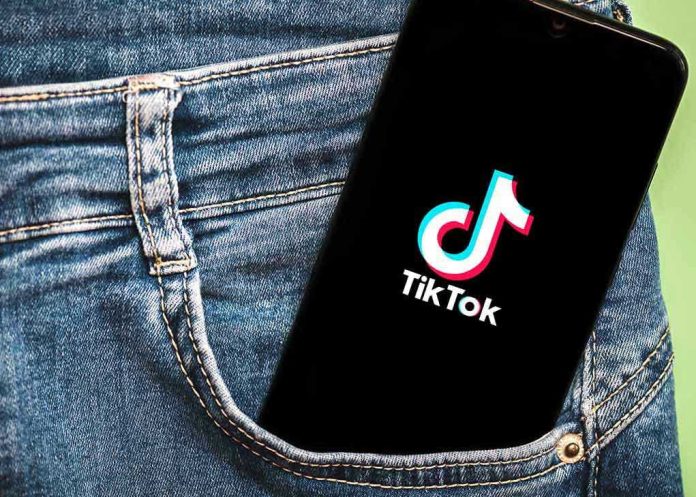🔴 Website 👉 https://u-s-news.com/
Telegram 👉 https://t.me/usnewscom_channel
Federal agents have raided the home of Robert Shinn, the so-called “TikTok cult” leader, as explosive allegations of sex trafficking and manipulation swirl around his influencer empire—raising uncomfortable questions about how faith, fame, and unchecked power collide in today’s America.
At a Glance
- Robert Shinn, founder of Los Angeles’ Shekinah Church and 7M Films, is at the center of a federal sex-trafficking investigation.
- Shinn’s organizations are accused of manipulating young TikTok influencers, isolating them from families, and exploiting their viral fame for profit.
- The Netflix docuseries “Dancing for the Devil” reignited national scrutiny and legal action against Shinn’s network.
- Ongoing lawsuits and investigations expose a disturbing blend of religious control and celebrity management in the digital age.
Federal Sex-Trafficking Probe Hits Los Angeles “Cult” Leader
Federal law enforcement officers executed a search warrant at the home of Robert Shinn, the Korean-American pastor whose web of businesses and religious organizations have drawn accusations of cult-like control and exploitation. Shinn, who founded Shekinah Church in 1994 and launched 7M Films in 2021, has used his pulpit and his management company to draw in dozens of young, ambitious TikTok dancers. His talent agency shot to prominence by representing viral social media influencers, but behind the glitzy façade, former members and families allege a system of coercion, isolation, and financial manipulation that echoes some of the darkest abuses America has seen in the intersection of religious zealotry and showbiz. The raid comes on the heels of mounting lawsuits and the bombshell Netflix documentary, “Dancing for the Devil,” which pulled the curtain back on Shinn’s operations and ignited a firestorm of public outrage.
Law enforcement officials aren’t commenting on the specifics of the ongoing investigation, but the message is clear: authorities are taking the claims against Shinn and his inner circle seriously. The families of several influencers, including the high-profile Wilking family, have fought for years to get their daughters back and bring media attention to what they call a “cult.” The scale and reach of Shinn’s empire—spanning entertainment, religion, and social media—have complicated efforts to hold anyone accountable, raising the stakes for both victims and law enforcement. As the probe unfolds, the American public is left wondering how such a network could thrive for so long right under Hollywood’s nose—and why existing laws failed to prevent this brand of exploitation.
Allegations of Manipulation, Isolation, and Exploitation
Robert Shinn stands accused by former members and the families of his talent of using a toxic mix of religious authority and business control to dominate every aspect of his followers’ lives. The playbook is depressingly familiar: recruits are drawn in with promises of faith, belonging, and stardom—then cut off from family, subjected to relentless indoctrination, and pressured to hand over earnings. Lawsuits and investigative reports allege that Shinn’s church and 7M Films operate as a unified front, blurring the line between spiritual “guidance” and outright exploitation. Reports from the LA Times, Business Insider, and Deseret News all point to a pattern of high-control tactics—financial secrecy, isolation, and a charismatic leader with unchecked power.
Current and former talent describe being pressured to sever ties with family, sign away substantial portions of their earnings, and submit to church doctrine as a condition of career advancement. The most high-profile case, Miranda Derrick, has publicly denied being manipulated, while her family and others insist she is under undue influence. This split—between current loyalists and those who broke free—underscores just how potent and divisive Shinn’s methods have become. With lawsuits and investigations piling up, the risk to young, vulnerable influencers in the digital economy has never been clearer.
Legal Fallout and Industry Reckoning in the Wake of National Attention
The release of “Dancing for the Devil” has forced the entertainment world and regulators into an uncomfortable spotlight. Once a niche scandal whispered about in influencer circles, the story of Robert Shinn and his 7M Films is now a national cautionary tale. Multiple lawsuits are underway, alleging fraud, coercion, and emotional distress. Shinn’s network of businesses—spanning everything from film production to music and influencer management—remains operational, but the legal and reputational toll is mounting. Experts warn that the case exposes major gaps in oversight for both religious organizations and talent agencies, particularly in the Wild West of social media fame.
The long-term implications are sobering. If the lawsuits succeed, Shinn’s empire could be dismantled or restructured, and lawmakers may finally be forced to draw a line between freedom of religion and the protection of vulnerable young people from predatory leaders. For now, the court of public opinion is in session, and Americans who cherish family values and accountability are watching closely. The fusion of faith, commerce, and unchecked authority in Shinn’s operations is a stark warning of what happens when the pursuit of fame and profit tramples common sense, transparency, and basic decency.
Sources:
LA Times: TikTok cult: Where are they now?
Deseret News: 7M TikTok Netflix
Business Insider: Robert Shinn and the 7M TikTok cult
